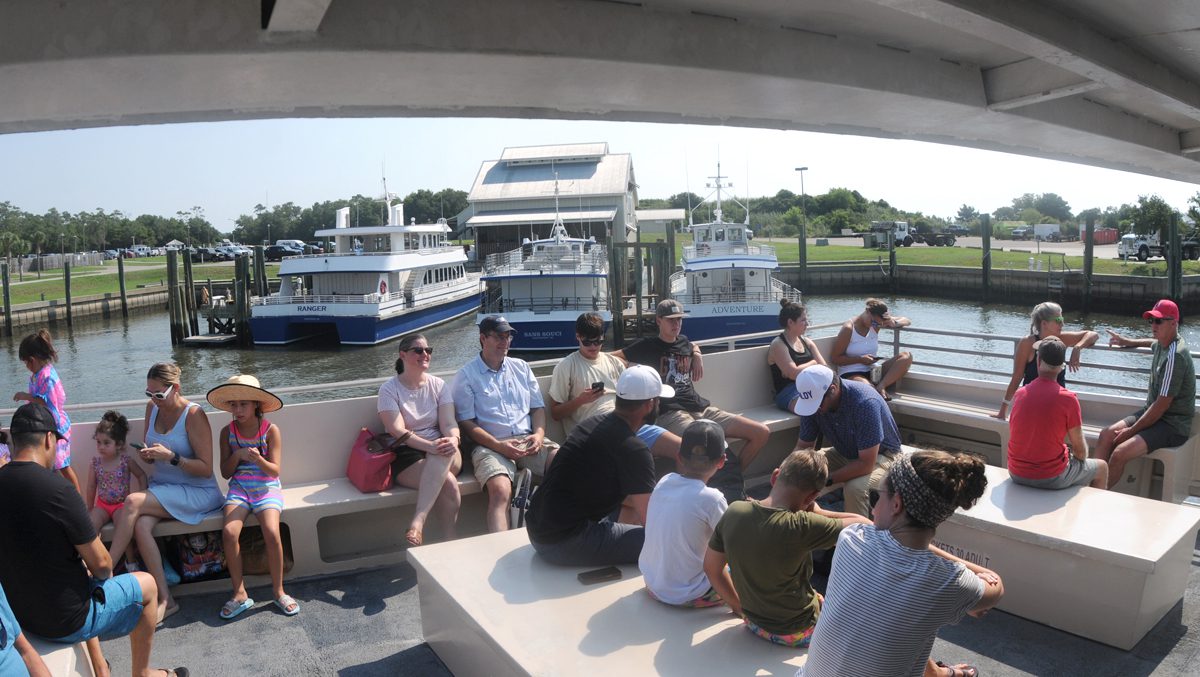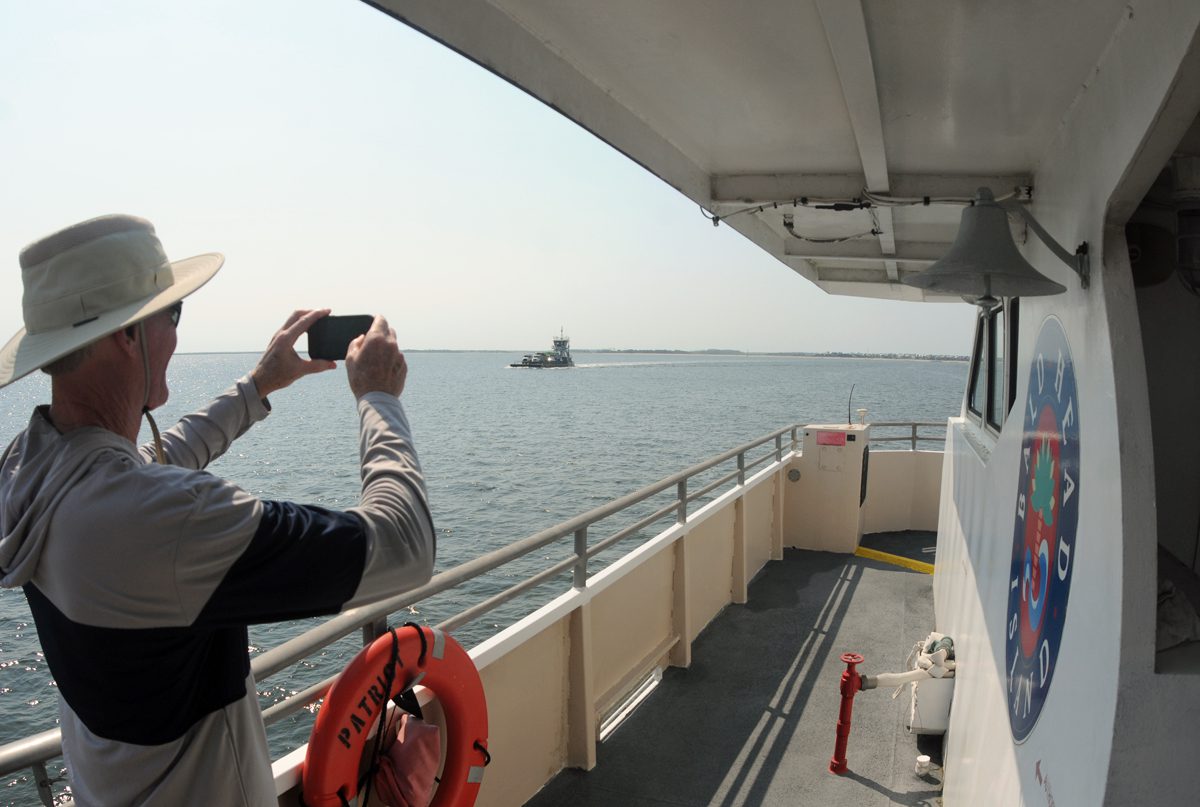
BOLIVIA – A request to bump Bald Head Island ferry hourly departures to every 90 minutes got a verbal thumbs down from nearly everyone who spoke at a state-hosted public hearing Tuesday night.
The schedule change proposed by the private company, Bald Head Island Transportation Inc., would disrupt ferry runs that coincide with start and end times of the only school on the island, increase commute times for workers going to and from the island, and force businesses on the island to shrink their hours of operation, opponents of the change argued.
Supporter Spotlight
A handful of those who spoke at Tuesday’s hearing the North Carolina Utilities Commission held in Brunswick County Courthouse Courtroom 2 said they did, however, favor a hybrid schedule that has been floated around, but not submitted to the commission for consideration.
Elizabeth Stephen, a 30-year Bald Head property owner and 8-year full-time resident, said she was 100% in favor of the hybrid schedule, one that purportedly would begin and end departures to and from the island on the current 30-minute schedule and shift to a 45-minute schedule midday.
Stephen was among roughly 30 people scattered throughout the courtroom where utilities Commissioner Karen Kemerait, who headed the hearing, sat at the front of the room in the seat typically reserved for a judge.
Those who signed up to speak at the hearing were sworn in before taking a seat in the courtroom witness box, where they were allowed to give no more than a 3-minute-long statement and answer questions of commission members and attorneys representing various groups that have intervened in the application review process.
Bald Head resident Jesse Hermann, one of nearly a dozen people to speak at the hearing, said the proposed schedule change would be, simply put, a reduction in capacity.
Supporter Spotlight
“The ferries are going to get more crowded as you reduce the schedule,” he said.
The impact to people who frequently travel on and off the island would be akin to shutting down a heavily used commuter thoroughfare to every other hour of the day, a move that would substantially increase the amount of time a person commutes, Hermann argued.
He suggested the ferry service might be able to turn to making procedural changes, including finding more efficient ways to load and unload passengers and their luggage, and add more trams to shuttle passengers and their luggage to and from the ferry landing on the island.
Island property owner Trisha Johnson hopped a flight from her hometown of Athens, Georgia, to speak at the hearing, where she said the proposed “schedule change” is, in her estimation, a capacity reduction.
“The capacity of the ferry is not sufficient and reducing it is not going to solve the problem,” she said.
Nicola Cutler, a teacher at Bald Head Island Academy, a private K-8 school that first opened its doors in 2022, said the proposed schedule was unrealistic because the ferry run times would not align with the start or end of the school day.
“This schedule does not fit into our school schedule whatsoever,” she said.
“Numerous” students ride the ferry to get to and from school, Cutler said, adding that about 20% of those students have parents who work on the island.
The academy, Bald Head Island Academy Foundation Inc., Village of Bald Head Island, Bald Head Island Clu,b and Bald Head Association all intervened in the transportation company’s Feb. 19 application to the utilities commission.

A 90-minute passenger ferry schedule would not provide “enough capacity to meet the island’s current and growing needs,” Village Mayor Peter Quinn wrote in an announcement last week about the public hearing.
In a presentation to the village council earlier this year, Bald Head Island Transportation President Chad Paul said increased demand for passenger ferry and tram service has caused a lapse in on-time performance.
“The issue for the schedule is not just the ferries, it’s the trams,” he said at that February meeting. “We’ve got 350 more homes built since 2010.”
That was the first full year of ferry operations from the mainland terminal at Deep Point Marina in Southport to the island, when annual round-trip ridership was 570,000, according to the company’s application.
That number jumped to 700,000 in 2019. Last year, a record 782,000 passengers took the ferry.
More than 3 million pounds of baggage has been loaded and unloaded by hand aboard ferries each year since 2021 and, last year, more than 4,500 larger items that do not fit in dollies, including bicycles, kayaks, canoes and “large luggage items” were transported, according to the application.
About 85% of ticket buyers since June 2023 have purchased electronic tickets either online or through the transportation company’s mobile app, Paul told council members earlier this year.
While that has helped passengers see which ferries are already sold out and which ones are available for booking, it has not curtailed a “capacity issue” that caught the company off guard, he said.
“It kind of eased up on us and kind of hit us all at once,” when the company started selling passes to some of the larger employers on the island, Paul said.
Employers do not ask their employees to step aside and leave spots open for residents and guests on an otherwise fully ferry, he said. That means that either the customer or an employee gets bumped to the next available ferry.
Paul said there has been a 22% decrease in the number of passengers getting bumped to the next available ferry since the electronic ticketing system began.
“I would think, too that the 45-minute schedule would have even fewer bumped boats,” he said in February.
According to the company’s application, the contractor ferry, which is reserved for contractors who work on the island and may be utilized by employees as well, would continue to depart from the mainland terminal at 5:30 a.m. and from the island at 6 a.m. Monday – Friday during the summer and winter months.
In summers, the first passenger ferry would leave the mainland at 6 a.m. Monday-Friday instead of the current time of 7 a.m. and depart the island at 6:45 a.m. on weekdays. The first passenger ferry from the mainland would depart weekends at 6 a.m. and from the island at 6:30 a.m.
The last passenger ferry would leave the mainland each night at 10:30 p.m. and the island at 11 p.m.
In winters, the last passenger ferry would leave the mainland at 9 p.m. Sunday through Thursday and 10:30 p.m. on Fridays and Saturdays. The last ferry to leave the island would be at 9:45 p.m. Sunday through Thursday and 11 p.m. on Fridays and Saturdays.
Bald Head Island Conservancy Executive Director Chris Shank said the proposed schedule change would easily result in two weeks’ worth of lost worktime in a calendar year for his staff, lengthen their commute times and, in turn, likely increase staff turnover.
“The ferry’s already late,” he said. “A larger ferry would be nice. Having increase capacity during commuting times would be enormous.”
Southport resident Lindsey Urso said the ferry system she uses five times a week to get to the island to work “is an absolute disgrace.”
“What we are seeing recently with our ferry system is a complete failure on all fronts,” she continued. “We have delays that stretch hours and hours on end. These aren’t minor inconveniences. They are disruptions that affect people’s lives. Right now, the system is failing us.”
Island resident Robert Drumheller was the only person who spoke in favor of the proposed schedule change, saying the 5-nautical-mile trip between terminals, the time needed to move passengers and their luggage on and off the ferries and then transport them by tram to homes throughout the island essentially makes it impossible to run under the current schedule.
“I think we need to give this a try,” he said.
If after a year or so the schedule does not prove itself, the transportation company could revisit the matter, Drumheller said.
An expert witness hearing on the schedule change application is set for Nov. 5 in the utilities commission hearing room 2115, Dobbs Building, 430 North Salisbury St., Raleigh. The full schedule may be found online.







